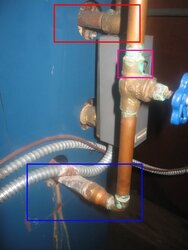Hi all,
I have a oil-fired hot water boiler w/ baseboard hearing system that I usually keep switched-off during the summer. The same system also provides hot water for domestic needs. I keep the system shut-off during the summer as I don't use hot water during summer. Here is the problem (attached pics) - I noticed the cold water pipe (that server hot water for domestic needs) going into the boiler is getting corroded/rusted. Is there a logic/reason why this happened? The boiler itself seems relatively new. I don't have the complete history of the boiler since I bought this house a little over a year ago only.
1. Can someone tell me why this happened?
2) How to correct this? Is this an easy DIY work or need professionals?
3) how to prevent this from reoccurring.
Image description
image1 - cold water inlet marked in blue, hot water outlet marked as red
I have a oil-fired hot water boiler w/ baseboard hearing system that I usually keep switched-off during the summer. The same system also provides hot water for domestic needs. I keep the system shut-off during the summer as I don't use hot water during summer. Here is the problem (attached pics) - I noticed the cold water pipe (that server hot water for domestic needs) going into the boiler is getting corroded/rusted. Is there a logic/reason why this happened? The boiler itself seems relatively new. I don't have the complete history of the boiler since I bought this house a little over a year ago only.
1. Can someone tell me why this happened?
2) How to correct this? Is this an easy DIY work or need professionals?
3) how to prevent this from reoccurring.
Image description
image1 - cold water inlet marked in blue, hot water outlet marked as red


